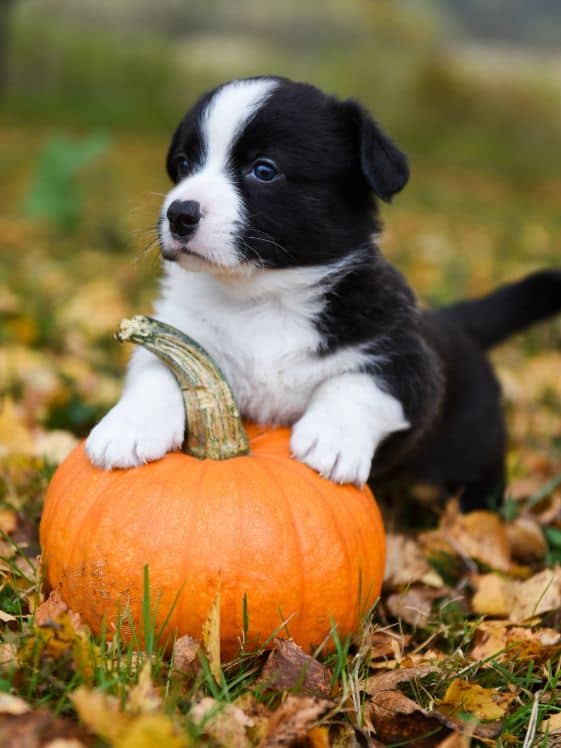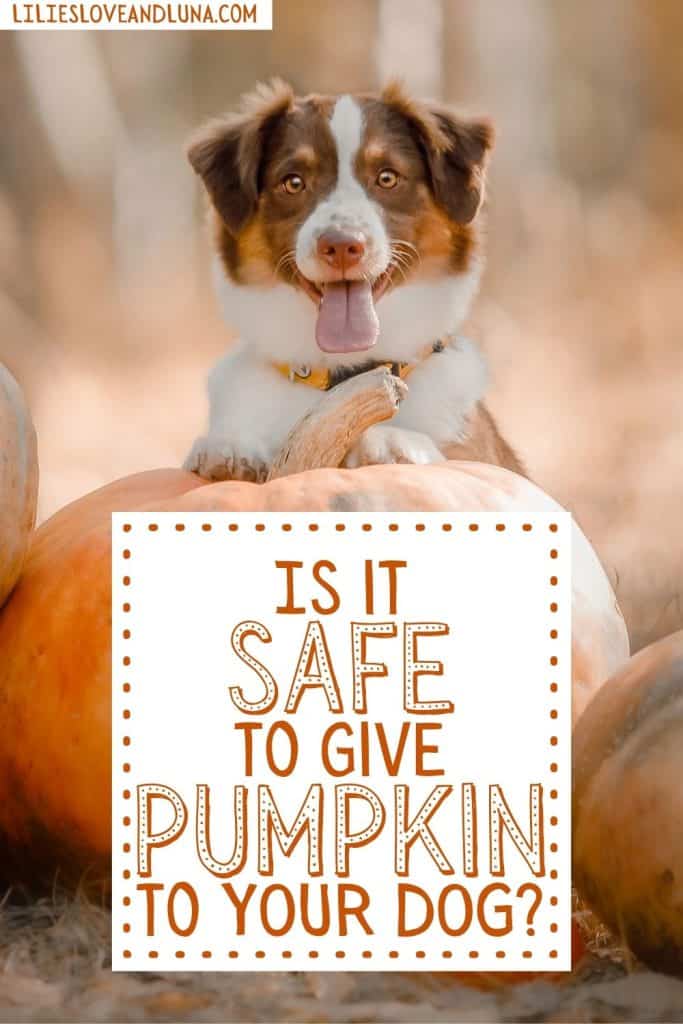Last Updated on October 23, 2025 by Shannon
Fall is right around the corner, which means pumpkin season for dogs and their humans alike. Pumpkin pie, pumpkin bread, pumpkin bars, pumpkin spice lattes, you name it, there’s probably a pumpkin version in the fall.
But with all that pumpkin around, you might wonder: Can dogs eat pumpkin? Is it good for them? And most importantly (to your dog, anyway), will they like it?
I can answer two of those questions right away: yes, pumpkin is safe for dogs, and while every dog is different, both Luna and Morgan absolutely love it.

This post may contain affiliate links. That means if you click on them and buy something, I may receive a small commission at no cost to you. Read my Disclaimer Policy to learn more.
Is Pumpkin Safe for Dogs?

Pumpkin is a safe and healthy treat for dogs. In small amounts, it won’t cause problems; in fact, it can offer several health benefits.
Just make sure you only give your dog the pumpkin flesh. Avoid the skin and stem, as they can be tough to digest and may pose a choking hazard.
Benefits of Pumpkin for Dogs

Pumpkin offers a surprising number of benefits for dogs. Here are just a few ways it can help keep your dog healthy and happy.
Aids with Constipation
Pumpkin is packed with fiber, which can help relieve constipation. The fiber draws moisture into the digestive tract and helps manage stool firmness.
If your dog is having trouble going to the bathroom, try adding a small amount of pumpkin to their diet and see if it helps.
Before trying home remedies, always check with your vet. They can let you know if it’s safe to try pumpkin and how much your dog should have.
Helps with Diarrhea
Believe it or not, pumpkin can help with both constipation and diarrhea. That’s because it’s a soluble fiber, meaning it can absorb excess water in the intestines and help firm up loose stools.
If your dog has diarrhea, contact your vet before giving any new food. They’ll help determine whether pumpkin is appropriate or if your dog needs to be seen.
Supports Weight Management
Pumpkin is low in calories but high in fiber, a winning combo for weight control. The fiber helps your dog feel full longer, and the low-calorie content supports weight loss goals.
If you’re using pumpkin for weight management, talk with your vet first. They can help you decide how much to feed and track your dog’s progress safely.
Boosts Immunity and Provides Key Nutrients
Pumpkin is a powerhouse of vitamins and minerals. It’s rich in vitamins A, C, and E, which support immune health, protect cells from damage, and keep your dog’s skin and coat looking their best.
It’s also a good source of iron and potassium, essential for healthy muscles, blood, and overall body function.
Helps with Hydration
Pumpkin has a high moisture content, which helps keep your dog hydrated, especially if they eat mostly dry food.
Dry kibble has very little water, so adding moist foods like pumpkin can give your dog a little hydration boost.
Most dogs drink enough water on their own, but for those who don’t, a spoonful of pumpkin in their meal can make a difference.
Can Pumpkin be Harmful to Dogs?
Pumpkin is generally very safe when given in moderation. However, too much pumpkin can lead to digestive upset.
As long as your dog isn’t allergic and you feed an appropriate amount, pumpkin is a safe and healthy treat. When in doubt, ask your vet for guidance.
How Much Pumpkin Can Dogs Have?
The right amount of pumpkin depends on your dog’s size:
- Small dogs: up to 2 teaspoons per day
- Large dogs: up to 2 – 4 tablespoons per day
Your vet can give you the most accurate recommendation based on your dog’s size, diet, and health needs. Always check with them before adding new foods, especially if your dog has medical issues.
How to Introduce Pumpkin to Your Dog’s Diet

Add pumpkin slowly to your dog’s food to prevent stomach upset. Jumping straight into high-fiber foods can cause gas, diarrhea, or constipation.
If your dog isn’t a fan of plain pumpkin, mix a spoonful into their regular food to help them get used to the taste.
How to Prepare Pumpkin for Dogs
Dogs can eat either fresh pumpkin or plain canned pumpkin. If using canned, check the label — it should say 100% pumpkin with no added sugar, spices, or artificial sweeteners. Avoid pumpkin pie filling.
To make your own pumpkin puree:
- Choose a small pie pumpkin (not a large jack-o’-lantern type).
- Wash, cut in half, and remove the seeds and stringy insides.
- Place the halves on a baking sheet and bake at 350°F for 45 minutes, or until fork-tender.
- Let cool, scoop out the flesh, and puree until smooth.
Avoid feeding raw pumpkin; baking makes it safe and easier to digest.
Storing Pumpkin for Dogs
Store leftover pumpkin in the fridge for a few days or freeze it for up to three months.
For easy portioning, freeze pumpkin in an ice cube tray. Once frozen, transfer the cubes to a freezer bag and thaw as needed.
What to Avoid When Giving Your Dog Pumpkin
Not all pumpkins are safe for dogs. Avoid:
- Decorative pumpkins (may contain paint, glue, or mold)
- Pumpkin pie filling (often has sugar, nutmeg, or xylitol)
- Pumpkin skin and stems (can be tough and pose a choking risk)
- Rotting pumpkins (may contain harmful bacteria or mold)
If you wouldn’t eat it yourself, don’t feed it to your dog.
Homemade Pumpkin Dog Treats
Pumpkin also makes a delicious base for homemade treats! Try one of these recipes next:
Soft Peanut Butter and Pumpkin Treats
No-Bake Peanut Butter and Pumpkin Dog Treats
Final Thoughts
If you’re looking for a healthy, natural way to add variety to your dog’s diet, pumpkin is a great choice. It’s full of essential nutrients, supports digestion, and most dogs love the taste.
When cooking or preparing pumpkin puree at home, skip the spices and sugar; your dog will love it just the way it is.
Related Posts








Is sweet potato safe for dogs, because I was just wondering if sweet potato could be substituted for pumpkin
Sweet potato is safe for dogs as long as it is cooked first and it is recommended to peel it before giving it to them.